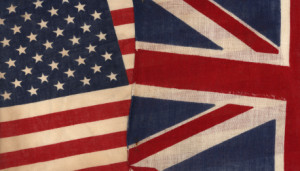The American Revolution Reborn: The Revolution as Civil War Recap
Part 3 of my Revolution Reborn Conference Recap. (See Part 1: Opening Roundtable & Part 2: Global Perspectives)
 Revolution as Civil War
Revolution as Civil War
Chair: Barbara Oberg
Panelists:
Travis Glasson, "Intimacies of Occupation: Fraternization, Compromise, and Betrayal in Revolutionary-era Newport"
Michael McDonnell, “The Other Three Fifths: Neutrals in the American Revolution”
Kimberly Nath, “Loyalism, Citizenship, American Identity: The Shoemaker Family”
Aaron Sullivan (Ph.D. Candidate, Temple University), “In but not of the Revolution: Neutrals and British-Occupied Philadelphia”
Biggest Takeaway: Historians need to get at how civilians experienced the Revolutionary War. They also need to include the largest demographic in their war narratives: the Disaffected.
Biggest Question: How can scholars get at the civilian and disaffected experience?
Panel Summary
Glasson would like to know more about the civilian experience during the Revolutionary War. In Newport, R.I., civilians lived alongside several thousand British and Hessian troops for 3 years and among several thousand French troops prior to Yorktown. Civilians and soldiers befriended each other, offended each other, & formed grudges against each other. Newport had a lot of people who did not fit neatly into the patriot or loyalist camps. Scholars need to place more emphasis on the people in the middle, the disaffected and show how people’s political opinions changed throughout the war.
McDonnell sees the Revolutionary War as a civil war. Historians generally leave loyalists, Native Americans, African-Americans, and other opponents of the patriots out of their Revolutionary War narratives. They also leave out Americans who tried to take a middle path. Invariably divisions among Americans prolonged the war. The war and disaffection gave rise to new divisions between the states and between state and continental officials who felt that they had given more than others to the war. The Revolutionary War heightened localism rather than nationalism.
Nath studied the Shoemaker Family of Philadelphia to illuminate the loyalist experience during the war and what happened to those who returned home after the war. She argued that American citizenship came to be defined by what it was not rather than what it was. Citizens were not loyalists.
Sullivan believes that contemporaries and later scholars left the disaffected out of their narratives because disaffection comprises a tough rallying cry. The disaffected outnumbered the patriots. Sullivan also noted the intolerance of the disaffected towards the Revolution; the patriots angered the disaffected by making participation in the Revolution mandatory.
Official Commentary
Li Jianming (Peking University)
Jianming observed that any revolution is a civil war. However, the American Revolution stands as a peculiar one because it occurred in both North America and the British Isles. Ordinary people did not always leave good records and a paucity of sources might cause historians to say more than they should about their experiences. Scholars need to be careful not to lump ordinary people in with the elite as they stood as antagonistic groups during the Revolution.
Kars reflected on how scholars know more about revolutionary leaders than about ordinary revolutionaries. The same stands true of slave rebellions, especially the one in Haiti. Many runaway slaves hid from rebels and masters alike during the slave rebellion in Berbice. Such evidence suggests that we need to look at the motivations and ideology of slaves. We need to write narratives that focus on the effects of revolution on the local community, not on the rhetoric of liberty.
Ulrich discussed how Americans look upon the Revolution as a positive term because “revolution” means a life cycle; a revolution might be something Americans want to experience again. “Civil war” denotes something negative and ugly. Americans don’t want to repeat civil wars. The American Revolution was a destructive civil war. People lost the things they cared about most during the war: people & property.
Sampling of Question & Answer Remarks
Thomas Slaughter: The biggest problem facing scholars: as messy as the American Revolution was its settlement was stunningly peaceful. Scholars need to answer why that came about.
Sullivan: When we look at the Revolution today, we focus on the group of people caught in the middle. We talk about refugees & the victims of war. A new narrative of the American Revolution might look more like how we describe present-day revolutions in places like Syria.
Brendan McConville: Neutralism may have meant more than “I don’t want to get shot at or die.” Neutralism may have a positive ideological nature that we just can’t get at.
Tomorrow: Recap of the Violence and the American Revolution panel
Feel free to agree or engage with the points and questions raised in this conference by leaving a comment.